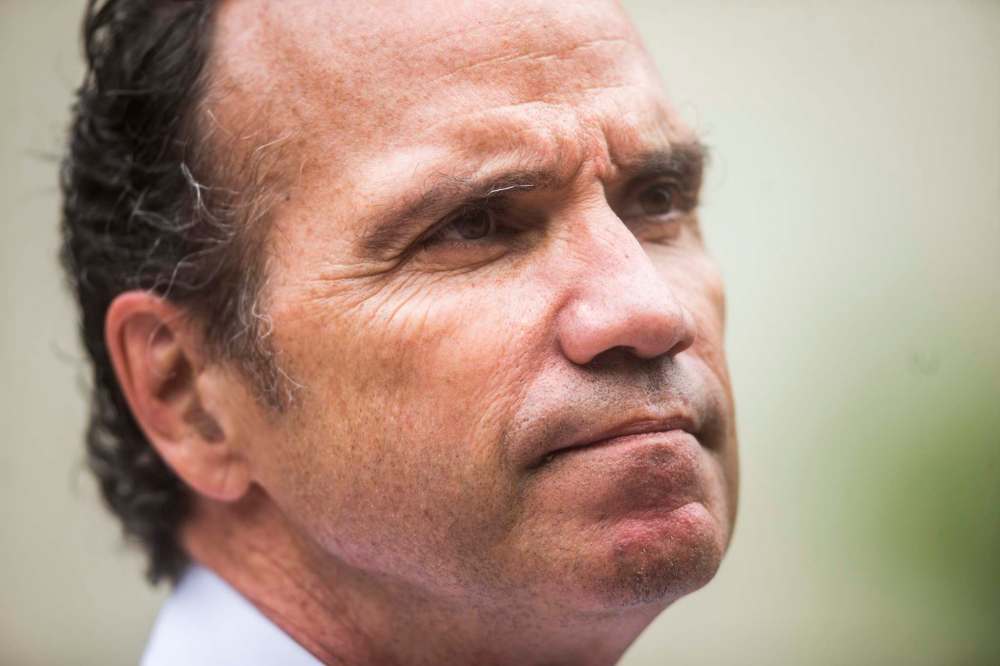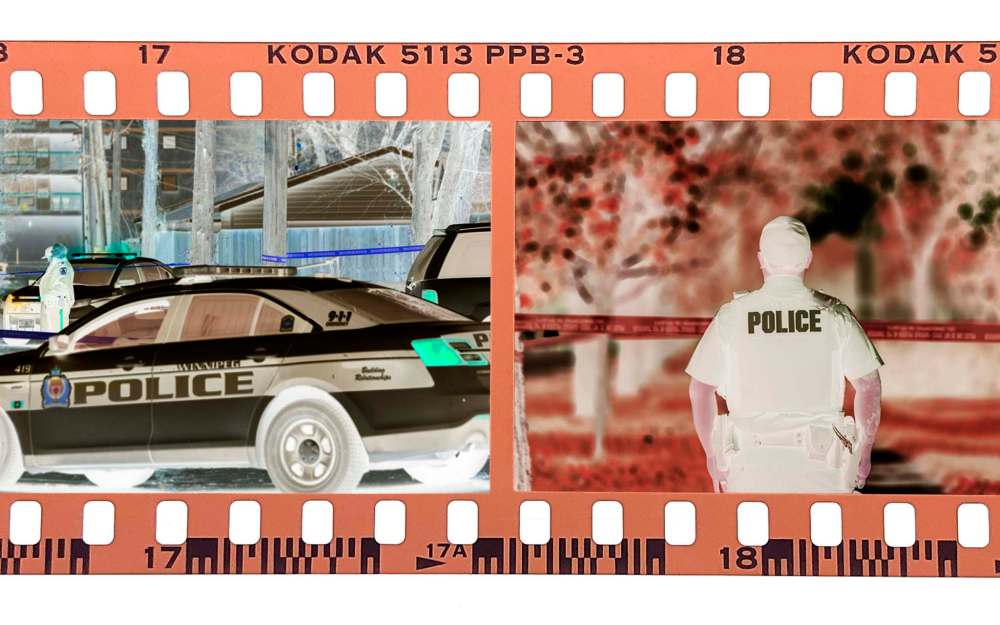Developing a case for transparency Civil lawsuits. LERA complaints. An IIU investigation. How one Winnipeg officer’s pattern of misconduct accusations makes the argument for greater public exposure when it comes to improper police behaviour
Read this article for free:
or
Already have an account? Log in here »
To continue reading, please subscribe:
Monthly Digital Subscription
$0 for the first 4 weeks*
- Enjoy unlimited reading on winnipegfreepress.com
- Read the E-Edition, our digital replica newspaper
- Access News Break, our award-winning app
- Play interactive puzzles
*No charge for 4 weeks then price increases to the regular rate of $19.00 plus GST every four weeks. Offer available to new and qualified returning subscribers only. Cancel any time.
Monthly Digital Subscription
$4.75/week*
- Enjoy unlimited reading on winnipegfreepress.com
- Read the E-Edition, our digital replica newspaper
- Access News Break, our award-winning app
- Play interactive puzzles
*Billed as $19 plus GST every four weeks. Cancel any time.
To continue reading, please subscribe:
Add Free Press access to your Brandon Sun subscription for only an additional
$1 for the first 4 weeks*
*Your next subscription payment will increase by $1.00 and you will be charged $16.99 plus GST for four weeks. After four weeks, your payment will increase to $23.99 plus GST every four weeks.
Read unlimited articles for free today:
or
Already have an account? Log in here »
Hey there, time traveller!
This article was published 31/07/2020 (1956 days ago), so information in it may no longer be current.
On a Friday morning in early June, Patrol Sgt. Jeffrey Norman went to court to testify about an impaired driving arrest he made last fall. The case quickly collapsed.
With Norman on the stand, the Crown prosecutor asked for an adjournment, and later stayed the charges Norman initiated against the alleged drunk driver — but not before the patrol sergeant was grilled about his own conduct during his 27-year career as a police officer in Winnipeg and Los Angeles.

It wasn’t the first time Norman has faced questions about his conduct. He’s been sued at least eight times in Manitoba for allegations including excessive force, wrongful arrest and destruction of video and photographic evidence.
Norman is currently the subject of at least one Independent Investigation Unit probe and was involved in another incident that has raised questions on whether the IIU should have been notified. In February, Norman was off-duty when he allegedly knocked out a suspected liquor-store thief with his police baton. Norman was also injured in the incident and suffered a concussion.
While under oath, Norman acknowledged he’s been the subject of complaints under Manitoba’s Law Enforcement Review Agency but said he didn’t know how many. He also admitted to facing misconduct allegations while working in the Los Angeles Police Department in the 1990s, but said he’d never been criminally charged.
Despite the repeated accusations against him, there hasn’t been any public finding of wrongdoing against Norman. The City of Winnipeg has issued financial settlements in more than one civil case involving Norman, the Free Press has learned, but the settlement process is private and the city refused to reveal how many of these lawsuits it has settled and how much they have cost taxpayers.
Amid a reckoning over the role of police in society, policymakers in various jurisdictions have taken steps to handle allegations of misconduct with greater transparency. Norman’s former employer, the Los Angeles Police Department, is now proactively disclosing decades-old internal records related to shootings and severe use of force, as well as confirmed cases of sexual assault and lying.
In Manitoba, provincial legislation that covers police governance and oversight has been under review since last year. The wide-ranging review of the Police Services Act is still underway, but part of its scope was to look at how provincial laws can best ensure transparency and consistency when dealing with police misconduct.
WPS will ‘adapt’ if law requires release of disciplinary records

Winnipeg Police Service Chief Danny Smyth said he’s not considering making internal WPS disciplinary records public, but in a July 10 interview with the Free Press, he suggested that could change if the law requires it.
“We have a pretty robust disciplinary system, but like most companies, it’s largely private, unless there’s criminal conduct involved, and then of course it becomes very public and we’ve always made any criminal charges that our members are involved in public,” Smyth said.
The police chief suggested the police union would object to making disciplinary records public.
“I won’t speak for the union, but I think the union would take exception on that… This along with many other things, I think, will be reviewed as part of the Police Services Act review, and if it is recommended or put into the act that we start to make our disciplinary records public, we’ll adapt accordingly.”
Smyth said he’s concerned about drawing comparisons between Canadian and American police forces, which has increasingly become part of the public discourse in the wake of the May 25 killing of George Floyd at the hands of Minneapolis police.
“There’s a lot of accountability that is built into our profession, and particularly here in Winnipeg, we’re pretty well-regulated and held accountable at just about every end of the spectrum.” – Chief Danny Smyth
“There’s a lot of accountability that is built into our profession, and particularly here in Winnipeg, we’re pretty well-regulated and held accountable at just about every end of the spectrum,” Smyth said. “The problem I see sometimes is that all police organizations are being judged and painted with conduct that’s happening in, sometimes, other countries even.”
Until last year, California had some of the tightest restrictions on public disclosure of police personnel files in the U.S. Police unions repeatedly blocked efforts to make such records public.
Under a relatively new law, passed by California lawmakers as charged debates over racial disparities in policing became increasingly mainstream, certain disciplinary records will be subject to public scrutiny for the first time.
Complaint process largely private

In Manitoba, police misconduct allegations and complaints are often not made public unless there’s a finding of wrongdoing, because the processes established to handle the complaints — such as LERA investigations and internal WPS probes by the professional standards unit — operate behind closed doors. The Independent Investigation Unit, which is required to investigate serious incidents involving on- or off-duty officers, doesn’t make officers’ names public unless criminal charges are laid.
LERA redacts the names of officers under investigation. The identity of an officer who has been the subject of a complaint is only made public if there is a finding of wrongdoing — which is exceedingly rare. From 1998 to 2018, there have been 4,579 formal LERA complaints filed and only 129 hearings, or 2.8 per cent.
The Free Press asked LERA how many times it had investigated Norman but did not receive a response. An IIU spokesman declined comment when asked the same thing.
Internal WPS disciplinary records and hearings, as well as investigations carried out by the professional standards unit, are not disclosed to the public.
“That’s crazy. It’s not perfect here. A lot of matters get settled through informal disciplinary routes. But if it’s a formal hearing, that hearing is presumptively public. The public has a great interest, and ought to have an interest, in allegations of misconduct against police officers they’re paying for.” – Ian Scott, the former head of Ontario’s Special Investigations Unit
Ian Scott, the former head of Ontario’s Special Investigations Unit, said he was surprised to learn WPS disciplinary hearings are kept from the public, which is not the case in Ontario.
“That’s crazy. It’s not perfect here. A lot of matters get settled through informal disciplinary routes. But if it’s a formal hearing, that hearing is presumptively public. The public has a great interest, and ought to have an interest, in allegations of misconduct against police officers they’re paying for,” Scott said.
“I think that situation ought to be remedied. I have no doubt that management and the (police union) are quite happy they’re in camera, but they’re not the only players in this game. The big players, I would have thought, would be the public.”
Ontario legislation requires police disciplinary hearings to be open to the public. In Winnipeg, however, the matter is decided through the collective bargaining process between the city and police union. The union agreement states any disciplinary proceedings must be kept private.
The long history of civil litigation

During his 22 years with the WPS, Norman has been sued eight times for various forms of alleged misconduct. On two occasions he was the sole named defendant, and in the six others he had one or multiple co-accused. At least one of the lawsuits remains before the courts.
A request to interview Winnipeg Police Association president Maurice Sabourin was declined. Instead, he provided a written statement in which he took issue with past Free Press reporting on Norman, saying it implied the existence of civil litigation is a sign of guilt.
“I will note that in each instance the City defended the member in the civil action. If they felt he had done something wrong, I suspect they would not have done so. It would not be appropriate for me to comment on the specific legal matters involving a specific member beyond this,” Sabourin wrote.
“In general, our members, like all Canadian citizens, have rights to privacy where appropriate. Settlements involve both parties, who must agree in order for a settlement to occur. If there was a finding of liability or conviction for any member, it would be a matter of public record.”
“I will note that in each instance the City defended the member in the civil action. If they felt he had done something wrong, I suspect they would not have done so.” – Winnipeg Police Association president Maurice Sabourin
In most cases, the city is obligated to pay legal costs for police officers, according to the collective agreement.
Despite a history of complaints, Norman received multiple raises during his time on the force, according to information culled from the city’s annual compensation disclosure documents.
Norman recently testified in court he was promoted to patrol sergeant within the past two years, which would have resulted in a corresponding bump in his salary.
The Free Press requested an interview with Norman through the WPS and his union. Those requests were declined.
The cross examination
In June, when Norman was on the witness stand in the impaired driving case, two different versions of events emerged about what had happened in the early hours outside Winnipeg’s police headquarters in October.
CIVIL LAWSUITS FILED AGAINST PATROL SGT. JEFFREY NORMAN
1. DATE OF INCIDENT: SEPT. 22, 2003
Statement of claim filed: Sept. 21, 2005
Number of co-accused: 7
● Allegation: Norman and co-accused assault a detained suspect at the Public Safety Building by throwing him against a wall, choking him, grabbing his neck, kicking and punching him, and smashing his head into a wall and table.
● Latest court filing: Amended statement of claim
2. DATE OF INCIDENT: APRIL 26, 2005
Statement of claim filed: April 24, 2007
Number of co-accused: 5
● Allegation: Two plaintiffs are unlawfully arrested and assaulted by police officers. One of the plaintiffs is threatened by an officer who says a “bag of cocaine” may have dropped out of his pocket. One suspect is taken to hospital to be treated for injuries where Norman attempts to get him admitted under the name “John Doe.”
● Latest court filing: Notice of discontinuance
3. DATE OF INCIDENT: AUGUST 2008
Statement of claim filed: Sept. 23, 2008
Number of co-accused: 2
● Allegation: Norman and other officers unlawfully detain a freelance photographer at a crime scene. Norman handcuffs the plaintiff too tight, leaving marks on his wrists. Other officers intimidate the plaintiff by telling him he won’t “fare too well” at the Winnipeg Remand Centre. The plaintiffs memory card is stolen from his camera before he is released without charge.
● Latest court filing: Notice of discontinuance
4. DATE OF INCIDENT: JULY 5, 2011
Statement of claim filed: June 28, 2012
Number of co-accused: 0
● Allegation: Norman twice shoots an unarmed man with a Taser outside a Winnipeg bar. The plaintiff is not charged with a crime.
● Latest court filing: Notice of discontinuance
5. DATE OF INCIDENT: JAN. 6, 2012
Statement of claim filed: Nov. 8, 2013
Number of co-accused: 4 + unknown officers
● Allegation: Norman uses false information to secure a search warrant at a Winnipeg residence. Later, the search warrant is executed and the plaintiffs traumatized by the experience. Their home is also allegedly damaged.
● Next court date: Aug. 12, 2020
6. DATE OF INCIDENT: APRIL 27, 2013
Statement of claim filed: March 11, 2015
Number of co-accused: 0
● Allegation: Norman unlawfully arrests an entire family — a father, mother, son and daughter — following a traffic stop. He assaults the father with a police baton multiple times. He uses excessive force while arresting the daughter. A mobile phone used to record the assault is seized and the video is deleted.
● Latest court filing: Statement of defence
7. DATE OF INCIDENT: JAN. 12, 2014
Statement of claim filed: Nov. 17, 2015
Number of co-accused: 1
● Allegation: The plaintiff is falsely arrested by Norman and co-accused. He’s handcuffed and slammed into a cruiser car, before being launched into the backseat. His cell phone, watch, wallet and cash are wrongfully seized from him.
● Latest court filing: Statement of claim
8. DATE OF INCIDENT: FEB. 7, 2016
Statement of claim filed: Feb. 6, 2018
Number of co-accused: 2
● Allegation: Plaintiff is unlawfully arrested by Norman, given a ticket and released. After being released, he begins recording the activity of police. The plaintiff is then assaulted by police, who break his arm, arrested a second time, given another ticket, before being released.
● Latest court filing: Notice of discontinuance
Seeing a vehicle driving slowly in a bus lane outside police HQ, Norman said he arrested an impaired driver at around 3 a.m. on Oct. 6 after conducting a field sobriety test based on his lengthy experience as a police officer. The 20-year-old man accused of impaired driving, through his defence lawyer, alleged Norman had improperly arrested him and used him as a “human shield” while pointing a Taser at the vehicle’s passenger.
“Can you confirm how many civil actions have been pursued against you for excessive force or unwarranted arrest?” criminal defence lawyer Matt Gould asked Norman.
“No,” Norman replied.
“You can’t confirm that?” Gould asked.
“Can’t confirm what?” Norman responded.
Gould asked again.
“Can you confirm how many times civil action has been taken against you with respect to your actions as a police officer?”
“No.”
Recalls being sued four times
The cross-examination exchange led to Norman explaining to the judge he didn’t want to provide the number of times he’s been sued because he said that information was used against him in a previous case for which he testified in court. Eventually, he testified he recalls being sued four times, and said he has been the subject of previous complaints through the Law Enforcement Review Agency and during his time at LAPD.
Gould zeroed in on past allegations against Norman to draw the court’s attention to his use of a Taser. On the stand, Norman admitted he drew his Taser — which he called a conductive energy weapon — and pointed it at the vehicle’s passenger while he was arresting the driver. He said the passenger was repeatedly trying to exit the vehicle even though Norman had told the young man to stay put while he dealt with the driver. A use-of-force report was never disclosed as part of the court process. Norman testified it didn’t have to be provided because it dealt with the male passenger, who wasn’t criminally charged, so was separate from the case at hand.
After Norman was questioned by Gould, Crown prosecutor Eric Hachinski asked for an adjournment of the trial, due to new issues he said arose during the cross-examination. No specifics were offered in court about what those issues were, and the trial never resumed.
On June 25, all of the charges against the 20-year-old man were stayed on a paper docket without being addressed in court again. The Free Press left messages with Hachinski but did not hear back. In Manitoba, Crown attorneys do not have to explain why they decided to enter a stay of proceedings — a practice that effectively drops the case.
In this case, there was no finality — no finding that Norman acted properly or improperly, or that the 20-year-old man was guilty or not guilty. Gould said he believed his client was innocent.
“It is a significant mistake to act like, when someone’s charges get dropped, that it’s a win,” he said. “It’s not. It’s a significant burden in terms of anxiety and stress and unfairness that goes on for a long time.”
Gould said Norman’s use-of-force report on his decision to draw his Taser wasn’t provided to the Crown prosecutor handling the case. He said it should have been disclosed.
“It is disheartening to experience a situation where an officer presents in a way that unfortunately will reflect on officers generally,” Gould said. “The responsibility that officers have to (act) at the highest level of responsibility and ethics and… reliability (and) experiences like this have an impact on everybody. It creates this distrust that is damaging to everyone overall.”
katie.may@freepress.mb.ca
ryan.thorpe@freepress.mb.ca



Katie May is a general-assignment reporter for the Free Press.

Ryan Thorpe likes the pace of daily news, the feeling of a broadsheet in his hands and the stress of never-ending deadlines hanging over his head.
Our newsroom depends on a growing audience of readers to power our journalism. If you are not a paid reader, please consider becoming a subscriber.
Our newsroom depends on its audience of readers to power our journalism. Thank you for your support.
History
Updated on Friday, July 31, 2020 7:41 PM CDT: Changed headline and sub headline















